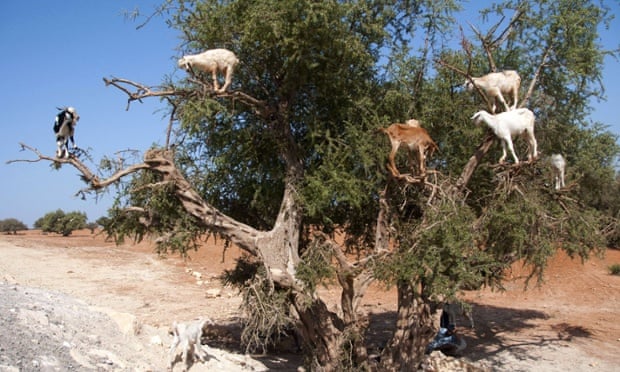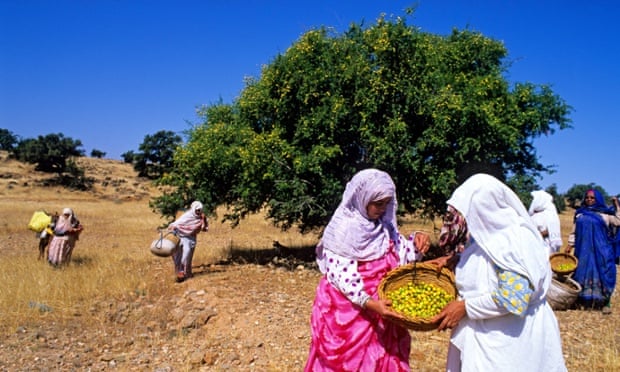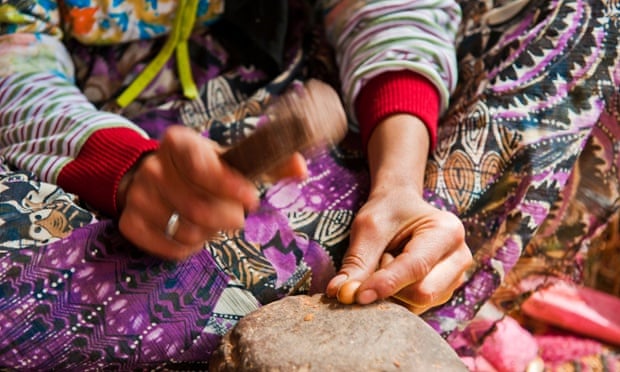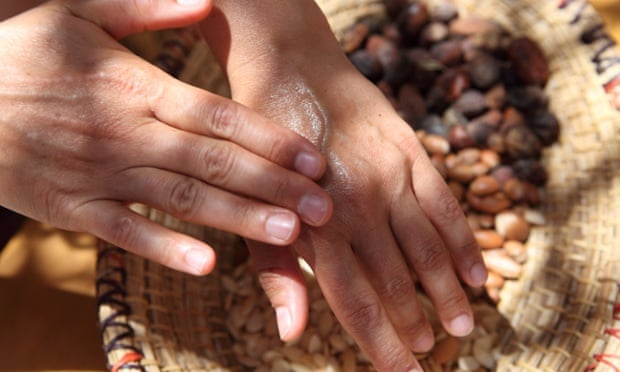Argan oil has gone from a natural, tribal ingredient to one of the
most prized oils in the world as cosmetics companies have woken up to
its anti-ageing properties. The plant oil is produced from the kernels
found inside the argan nut, which is found inside the fruit of the argan
tree, endemic to Morocco.
Women’s co-operatives have sprung up throughout the argan-producing region but not all are as co-operative as they make out. The argan tree remains under threat from overuse, deforestation and even goats.
The argan tree is grown almost exclusively in the barren lands of south-western Morocco. A natural barrier against the advance of the desert, it prevents soil erosion and protects water resources.
 The tree is so beneficial to the environment that Morocco’s argan forest
was declared a Biosphere Reserve by Unesco in 1998. Still, the forest
has been threatened with deforestation, as local people chopped down the
trees for building materials and firewood. This has diminished in
recent years as locals became involved in the production of argan oil.
The tree is so beneficial to the environment that Morocco’s argan forest
was declared a Biosphere Reserve by Unesco in 1998. Still, the forest
has been threatened with deforestation, as local people chopped down the
trees for building materials and firewood. This has diminished in
recent years as locals became involved in the production of argan oil.
Dana Elemara works for Sidi Yassine, an argan oil producer in the region. “One key thing to sustainability is getting local people involved and paying them fairly. That stops them from cutting down the Unesco-protected trees.” The production of the oil is, she says, helping preserve the tree. “You don’t damage the tree at all by producing argan oil. We only pick fruit from the ground.”
Getting oil from the fruit of the argan tree involves drying it, extracting the nuts, cracking them to reveal the kernels, and pressing them to release the oil. The byproduct of pressing is a thick argan paste, which is sold locally for cosmetic products. Nothing else is wasted, as the outer pulp provides food for village animals, while the shells are burned for fuel.
 L’Oréal, together with its supplier BASF, has set up a sourcing
programme in Morocco to foster corporate social responsibility in the
argan supply chain. The programme works with an umbrella body involving
six women’s co-operatives producing argan oil.
L’Oréal, together with its supplier BASF, has set up a sourcing
programme in Morocco to foster corporate social responsibility in the
argan supply chain. The programme works with an umbrella body involving
six women’s co-operatives producing argan oil.
As well as access to education and healthcare, the cooperative also provides the women with an opportunity to earn money. Professor Zoubida Charrouf of the Université Mohammed V-Agdal in Rabat, says some women earn up to $250 (£164) a month, plus bonuses that are paid out at the end of the year. With more financial independence, the women are able to choose how to spend their earnings, changing the status of women in the family. Charrouf says: “Women regain the capacity to decide, to manage their income and to invest in the future by sending their children to school.”
Others recognise a shift in attitudes towards women in general in this Arabic country due to their newfound independence. Elemara says: “The argan oil trade has made changes that will have an influence over the way that society sees women there.”

L’Oréal says its work with the NGO Yamana was crucial to overcome these challenges. Rachel Barré, who is responsible for sustainable sourcing within L’Oréal Research & Innovation says: “To lead this cooperative, [the women] have to get access to education. They have to understand what is business, what is a purchase order, what is governance, what is democracy, what is transparency, what is accounting.
With the help of the NGO that worked with them, we managed to organise this way of functioning and professionalise the way that every woman could have a voice in the decision-making process.”
There are also concerns about the standard of oil coming out of the co-operatives. British cosmetics retailer Lush uses argan oil in several of its products, which it sources from a supplier working with 22 women’s co-operatives across the region.
Lush’s creative buyer Lyndsey Fisher-Cooke says some kind of leadership is required to protect standards. “[The co-operatives] are headed up by an elected president. Someone is put at the helm of that organisation and supports them with visits to each village, in terms of ensuring quality standards.”
The co-operatives are improving standards all the time, she says, with help from Lush. “Our unit is working with each village to increase standards to be recognised by [certification body] Ecocert. Any co-operative needs some sort of accredited control to increase those standards; it’s an area that has potential for downfall.”
 It is thought that co-operatives can suffer from a lack of
professionalism towards their international customers. Ulysses Müller, a
Swiss national who gave up his life as an advertising executive to
pursue a dream in Morocco, runs Sidi Yassine with his Berber wide. He
believes their combination of skills makes their facility unique in the
region, and the farm counts Weleda and L’Occitane among its clients.
It is thought that co-operatives can suffer from a lack of
professionalism towards their international customers. Ulysses Müller, a
Swiss national who gave up his life as an advertising executive to
pursue a dream in Morocco, runs Sidi Yassine with his Berber wide. He
believes their combination of skills makes their facility unique in the
region, and the farm counts Weleda and L’Occitane among its clients.
Sidi Yassine does not aim to be a co-operative but says it pays fair wages to the women it employs. It can, however, only produce so much argan oil and Elemara says it has had to cut ties with some cosmetic companies that were pushing for it to produce more at a lower quality. Cosmetic companies are desperate to ensure their supply of argan oil, she says, and some of the larger ones are trying to buy up farms and co-operatives across the region.
Women’s co-operatives have sprung up throughout the argan-producing region but not all are as co-operative as they make out. The argan tree remains under threat from overuse, deforestation and even goats.
What is argan oil?
Traditionally, argan oil was used extensively in Morocco to treat various ailments, such as dry skin, acne, wrinkles and joint pain. Toasted, it is also a common ingredient in cooking, with health benefits ranging from lowering cholesterol to easing arthritis. As western countries cottoned on to this apparently magical resource, demand has shot up, with argan oil appearing in everything from shampoo bars to instant eye-tightening serum.The argan tree is grown almost exclusively in the barren lands of south-western Morocco. A natural barrier against the advance of the desert, it prevents soil erosion and protects water resources.
 The tree is so beneficial to the environment that Morocco’s argan forest
was declared a Biosphere Reserve by Unesco in 1998. Still, the forest
has been threatened with deforestation, as local people chopped down the
trees for building materials and firewood. This has diminished in
recent years as locals became involved in the production of argan oil.
The tree is so beneficial to the environment that Morocco’s argan forest
was declared a Biosphere Reserve by Unesco in 1998. Still, the forest
has been threatened with deforestation, as local people chopped down the
trees for building materials and firewood. This has diminished in
recent years as locals became involved in the production of argan oil. Dana Elemara works for Sidi Yassine, an argan oil producer in the region. “One key thing to sustainability is getting local people involved and paying them fairly. That stops them from cutting down the Unesco-protected trees.” The production of the oil is, she says, helping preserve the tree. “You don’t damage the tree at all by producing argan oil. We only pick fruit from the ground.”
Getting oil from the fruit of the argan tree involves drying it, extracting the nuts, cracking them to reveal the kernels, and pressing them to release the oil. The byproduct of pressing is a thick argan paste, which is sold locally for cosmetic products. Nothing else is wasted, as the outer pulp provides food for village animals, while the shells are burned for fuel.
Empowering women
Previously, women in small family businesses of two or three people would collect the argan fruit and extract its oil. Their husbands or brothers would then sell the oil in local markets or exchange it for sugar and other goods. In recent years, however, women’s co-operatives have been created to meet the surge in demand. These co-operatives provide the women with an income, as well as a social experience and improved status. L’Oréal, together with its supplier BASF, has set up a sourcing
programme in Morocco to foster corporate social responsibility in the
argan supply chain. The programme works with an umbrella body involving
six women’s co-operatives producing argan oil.
L’Oréal, together with its supplier BASF, has set up a sourcing
programme in Morocco to foster corporate social responsibility in the
argan supply chain. The programme works with an umbrella body involving
six women’s co-operatives producing argan oil. As well as access to education and healthcare, the cooperative also provides the women with an opportunity to earn money. Professor Zoubida Charrouf of the Université Mohammed V-Agdal in Rabat, says some women earn up to $250 (£164) a month, plus bonuses that are paid out at the end of the year. With more financial independence, the women are able to choose how to spend their earnings, changing the status of women in the family. Charrouf says: “Women regain the capacity to decide, to manage their income and to invest in the future by sending their children to school.”
Others recognise a shift in attitudes towards women in general in this Arabic country due to their newfound independence. Elemara says: “The argan oil trade has made changes that will have an influence over the way that society sees women there.”

Challenges in the supply chain
There are, however, problems with this burgeoning industry. The Berber women in the co-operatives are ill-equipped to conduct business with international organisations, leaving plenty of scope for exploitation. Charrouf says the big problem co-operatives still face is that the women have long remained marginalised and illiterate. “A lot of training is necessary. If they are well-trained, it works. But if not they end up being managed by the husband or father of the co-operative’s president, and in this case they benefit very little.”L’Oréal says its work with the NGO Yamana was crucial to overcome these challenges. Rachel Barré, who is responsible for sustainable sourcing within L’Oréal Research & Innovation says: “To lead this cooperative, [the women] have to get access to education. They have to understand what is business, what is a purchase order, what is governance, what is democracy, what is transparency, what is accounting.
With the help of the NGO that worked with them, we managed to organise this way of functioning and professionalise the way that every woman could have a voice in the decision-making process.”
There are also concerns about the standard of oil coming out of the co-operatives. British cosmetics retailer Lush uses argan oil in several of its products, which it sources from a supplier working with 22 women’s co-operatives across the region.
Lush’s creative buyer Lyndsey Fisher-Cooke says some kind of leadership is required to protect standards. “[The co-operatives] are headed up by an elected president. Someone is put at the helm of that organisation and supports them with visits to each village, in terms of ensuring quality standards.”
The co-operatives are improving standards all the time, she says, with help from Lush. “Our unit is working with each village to increase standards to be recognised by [certification body] Ecocert. Any co-operative needs some sort of accredited control to increase those standards; it’s an area that has potential for downfall.”
 It is thought that co-operatives can suffer from a lack of
professionalism towards their international customers. Ulysses Müller, a
Swiss national who gave up his life as an advertising executive to
pursue a dream in Morocco, runs Sidi Yassine with his Berber wide. He
believes their combination of skills makes their facility unique in the
region, and the farm counts Weleda and L’Occitane among its clients.
It is thought that co-operatives can suffer from a lack of
professionalism towards their international customers. Ulysses Müller, a
Swiss national who gave up his life as an advertising executive to
pursue a dream in Morocco, runs Sidi Yassine with his Berber wide. He
believes their combination of skills makes their facility unique in the
region, and the farm counts Weleda and L’Occitane among its clients. Sidi Yassine does not aim to be a co-operative but says it pays fair wages to the women it employs. It can, however, only produce so much argan oil and Elemara says it has had to cut ties with some cosmetic companies that were pushing for it to produce more at a lower quality. Cosmetic companies are desperate to ensure their supply of argan oil, she says, and some of the larger ones are trying to buy up farms and co-operatives across the region.
Δεν υπάρχουν σχόλια:
Δημοσίευση σχολίου